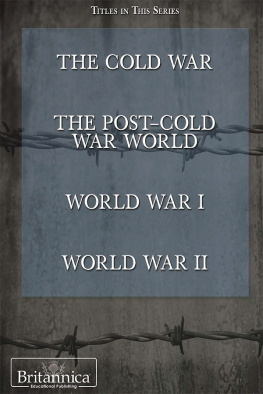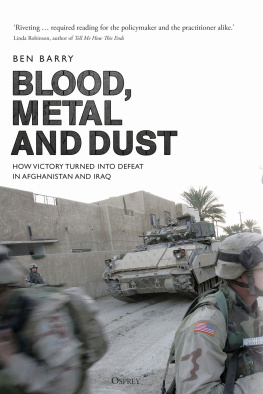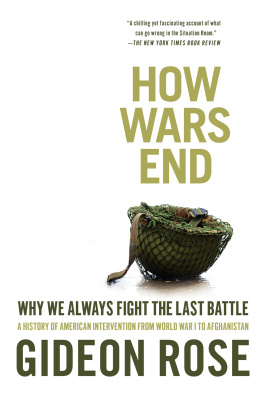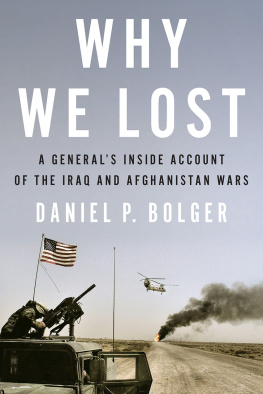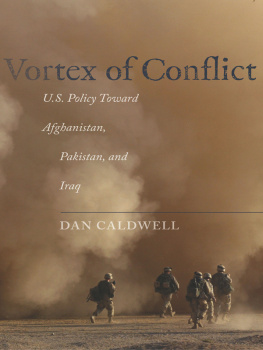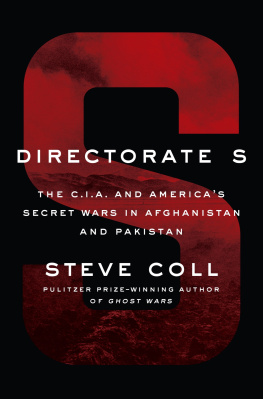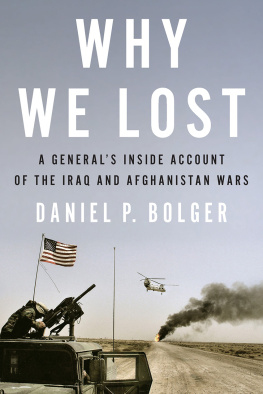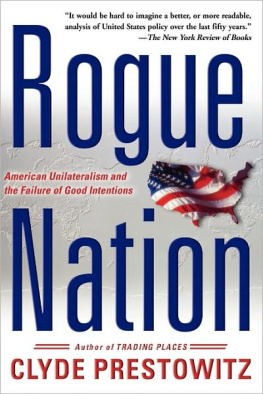
Why Nations Go to War
Mark P. Worrell
The United States has been involved in many wars, sometimes for noble causes like defeating Nazism, and, at other times, it has compromised its own ideals, leading to soul searching and regrets. Some wars are celebrated as glorious achievements (World War II), some are forgotten (Korea), and some are ignored (Afghanistan). The current wars in the Middle East represent a complex interplay of motivations, challenges, and threats to Americas role as the worlds democratic leadership. In the case of Afghanistan, we find that during the Cold War the U.S. defense and intelligence apparatus directly and indirectly created an incalculable number of radical extremists that have now turned their sights on their former benefactor. The invasion of Iraq represents a different calculus: Under the multitude of rationalizations rests a simple political-economic case of a master nation punishing a disobedient subject. In this brief book, Americas relationship with war is explored with an eye toward changes in capitalism from industrialism to post-industrialism, Americas involvement in the Cold War, nuclear proliferation, terrorism, torture, culture, and ideology.
Mark P. Worrell teaches Sociological Theory and courses in Politics, Religion, and Culture at the State University of New York at Cortland. Author of one previous book, Dialectic of Solidarity: Labor, Antisemitism, and the Frankfurt School , Professor Worrell has published widely in scholarly journals including Telos, Rethinking Marxism, Fast Capitalism , and Current Perspectives in Social Theory .
Framing 21st Century Social Issues
The goal of this new, unique Series is to offer readable, teachable thinking frames on todays social problems and social issues by leading scholars. These are available for view on http://routledge.customgateway.com/routledge-social-issues.html.
For instructors teaching a wide range of courses in the social sciences, the Routledge Social Issues Collection now offers the best of both worlds: originally written short texts that provide overviews to important social issues as well as teachable excerpts from larger works previously published by Rout- ledge and other presses.
As an instructor, click to the website to view the library and decide how to build your custom anthology and which thinking frames to assign. Students can choose to receive the assigned materials in print and/or electronic formats at an affordable price.
Body Problems
Running and Living Long in a Fast-Food Society
Ben Agger
Sex, Drugs, and Death
Addressing Youth Problems in American Society
Tammy Anderson
The Stupidity Epidemic
Worrying About Students, Schools, and Americas Future
Joel Best
Empire Versus Democracy
The Triumph of Corporate and Military Power
Carl Boggs
Contentious Identities
Ethnic, Religious, and Nationalist Confl icts in Todays World
Daniel Chirot
The Future of Higher Education
Dan Clawson and Max Page
Waste and Consumption
Capitalism, the Environment, and the Life of Things
Simonetta Falasca-Zamponi
Rapid Climate Change
Causes, Consequences, and Solutions
Scott G. McNall
The Problem of Emotions in Societies
Jonathan H. Turner
Outsourcing the Womb
Race, Class, and Gestational Surrogacy in a Global Market
France Winddance Twine
Changing Times for Black Professionals
Adia Harvey Wingfield
Why Nations Go to War
A Sociology of Military Conflict
Mark Worrell
Why Nations Go to War
A Sociology of Military Conflict
Mark P. Worrell
State University of New York at Cortland
First published 2011
by Routledge
270 Madison Avenue, New York, NY 10016
Simultaneously published in the UK
by Routledge
2 Park Square, Milton Park, Abingdon, Oxon OX14 4RN
Routledge is an imprint of the Taylor & Francis Group, an informa business
2011 Taylor & Francis
The right of Mark P. Worrell to be identified as author of this work has been asserted by him in accordance with sections 77 and 78 of the Copyright, Designs and Patents Act 1988.
Typeset in Garamond and Gil Sans by EvS Communication Networx, Inc.
All rights reserved. No part of this book may be reprinted or reproduced or utilised in any form or by any electronic, mechanical, or other means, now known or hereafter invented, including photocopying and recording, or in any information storage or retrieval system, without permission in writing from the publishers.
Trademark Notice : Product or corporate names may be trademarks or registered trademarks, and are used only for identification and explanation without intent to infringe.
Library of Congress Cataloging in Publication Data
Worrell, Mark P.
Why nations go to war : a sociology of military conflict / Mark P. Worrell.
p. cm. (Framing 21st century social issues)
1. War and societyUnited States. 2. WarEconomic aspectsUnited States. 3. United StatesHistory, Military. 4. WarCauses. 5. War (Philosophy) 6. Afghan War, 2001Social aspectsUnited States. 7. Iraq War, 2003Social aspectsUnited States. I. Title.
HM554.W67 2011
303.66dc22
2010029902
ISBN13: 978-0-415-89211-7 (pbk)
ISBN13: 978-0-203-83426-8 (ebk)
Series Foreword
The world in the early 21st century is beset with problemsa troubled economy, global warming, oil spills, religious and national conflict, poverty, HIV, health problems associated with sedentary lifestyles. Virtually no nation is exempt, and everyone, even in affluent countries, feels the impact of these global issues.
Since its inception in the 19th century, sociology has been the academic discipline dedicated to analyzing social problems. It is still so today. Sociologists offer not only diagnoses; they glimpse solutions, which they then offer to policy makers and citizens who work for a better world. Sociology played a major role in the civil rights movement during the 1960s in helping us to understand racial inequalities and prejudice, and it can play a major role today as we grapple with old and new issues.
This series builds on the giants of sociology, such as Weber, Durkheim, Marx, Parsons, Mills. It uses their frames, and newer ones, to focus on particular issues of contemporary concern. These books are about the nuts and bolts of social problems, but they are equally about the frames through which we analyze these problems. It is clear by now that there is no single correct way to view the world, but only paradigms, models, which function as lenses through which we peer. For example, in analyzing oil spills and environmental pollution, we can use a frame that views such outcomes as unfortunate results of a reasonable effort to harvest fossil fuels. Drill, baby, drill sometimes involves certain costs as pipelines rupture and oil spews forth. Or we could analyze these environmental crises as inevitable outcomes of our effort to dominate nature in the interest of profit. The first frame would solve oil spills with better environmental protection measures and clean-ups, while the second frame would attempt to prevent them altogether, perhaps shifting away from the use of petroleum and natural gas and toward alternative energies that are green.


